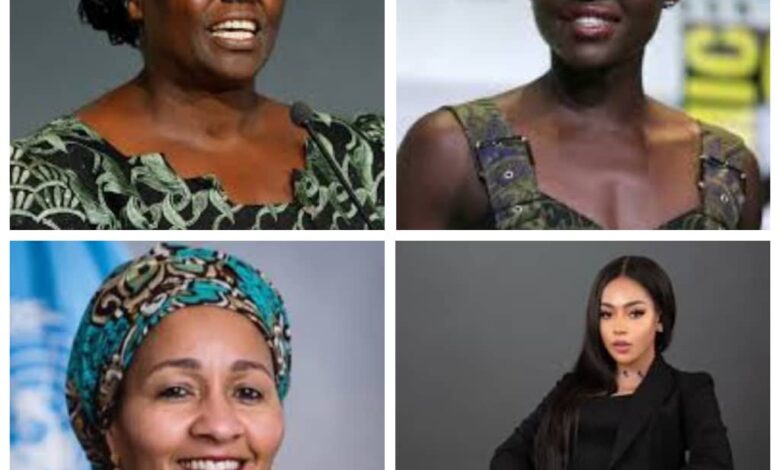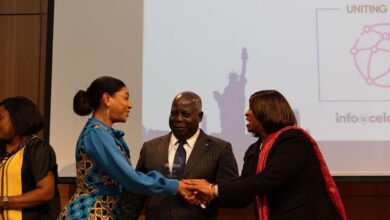African women as catalysts for change: Inspiring leaders shaping continent’s future

African women are positively contributing to various fields and influencing social, environmental, and economic transformation. They are shattering boundaries in sustainability, governance, arts, and entrepreneurship, empowering communities, and fostering development. Wangari Maathai is a case in point of someone who has been a champion of environmental conservation, while Amina J. Mohammed informs global policy on sustainable development. Lupita Nyong’o uses her voice for social justice and women’s rights, empowering many on the continent. Princess Spindrella Anaekpeluchi is revolutionizing Africa’s traditional fashion and empowering local craftspeople. They are all about resilience and innovation, clearly indicating that African women are key drivers of positive change on the continent.
- Wangari Maathai: Environmental Activism and Women’s Empowerment
Wangari Maathai’s activism was motivated by a profound love for Kenya’s land and a conviction that environmental health is inseparable from social justice. Growing up in rural Kenya, she saw how deforestation, soil erosion, and environmental degradation directly affected communities’ livelihoods. Her motivation was rooted in a desire to promote ecological sustainability, women’s rights, and democratic participation, believing that environmental stewardship was vital for societal well-being.
Wangari Maathai established the Green Belt Movement in 1977, an environmental group dedicated to tree planting, conservation, and community empowerment. The work not only fights desertification and deforestation but also provided a chance for women, who are usually on the frontlines of environmental suffering, to participate in leadership and economic opportunities. She blended ecological activism with social empowerment by stressing that sustainable development has to incorporate women’s voices.
Her efforts were globally appreciated, and her efforts culminated in her receiving the Nobel Peace Prize in 2004—the first African female to receive it. Maathai challenged authoritarian governments and demanded democratic change in Kenya through her leadership. She strongly criticized policies by the government undermining the environment and human rights and would sacrifice her own safety for justice.
Her inspiration was fueled by a systems approach: healthy environments support healthy societies. She felt that it was possible to create positive social change through empowering women in the context of environmental issues. Her work continues to inspire environmental and women’s rights activists in Africa and elsewhere. She showed that bottom-up activism from an ecological awareness can be the source of far-reaching societal change.
- Amina J. Mohammed: Championing Sustainable Development and Global Policy
Amina J. Mohammed’s inspiration is the result of a lifelong passion for social justice, sustainable development, and reducing inequalities. She was raised in Nigeria, where she was profoundly affected by the differences she saw and felt directly. Her aspiration to change the world was motivated by a wish to make the world more equitable so that development works for everyone and not the privileged few. Her writing reflects a belief in the potential of policy and international cooperation to effect fundamental change.
Amina J. Mohammed has been instrumental in development at the global level, particularly as the Deputy Secretary-General of the United Nations. She played a critical role in the formulation of the Sustainable Development Goals (SDGs), an ambitious agenda to eradicate poverty, safeguard the planet, and build a better future for all by 2030. Her work in this field is a testament to her passion for aligning social, economic, and environmental imperatives.
Before her stint at the UN, she was Nigeria’s Minister of the Environment, where she advocated for climate change, environmental sustainability, and urban development policies. Her focus on developing resilient cities and renewable energy resonates with her realization of the interdependence of environmental health and human well-being.
Her inspiration is based on a belief that sustainable development should be shared and that Africa’s voice should be at the center of global debates around the future. She believes in empowering marginalized communities, women, and youth to engage in full development processes. Her work is premised on the idea that sustainable progress is based on cooperation among sectors and borders—a principle that has earned her respect globally.
Amina J. Mohammed’s career is an example of how African women can influence global policy, negotiating towards a world that is just, sustainable, and resilient in development. Her life illustrates the power of vision, determination, and commitment to justice in building a better world.
- Lupita Nyong’o: Breaking Barriers in Arts and Representation
Lupita Nyong’o’s path is driven by her need to break stereotypes and ensure real representation of African stories and cultures. Raised in Kenya before emigrating to the United States, she noticed the lack of representation and misrepresentation of Africans in the mainstream media. Her drive was to utilize her voice and talent to create an increased awareness of African identities and empower young women and girls all over the world to chase their aspirations despite challenges.
Lupita Nyong’o received global recognition for her powerful performances in movies such as 12 Years a Slave, which earned her the Academy Award for Best Supporting Actress. Her role in depicting multifaceted characters brought African stories to the world stage, breaking monolithic stereotypes and presenting the richness and diversity of African cultures.
Besides her acting career, Nyong’o is an outspoken advocate for diversity, inclusion, and social justice. She uses her voice to denounce racial injustice, violence against women, and cultural stereotyping. Her involvement in campaigns such as the #BlackGirlMagic movement encourages young African women to celebrate themselves and aim high.
Nyong’o’s impact goes beyond entertainment; she is a role model showing women of African origin that they can succeed in international spaces historically held by others. Her legacy is built on the power of genuine storytelling and representation, motivating a new generation to envision themselves as drivers of change.
Her work showcases the potential of art and culture as instruments for social transformation, building bridges of empathy and comprehension between varying groups. Lupita Nyong’o’s achievement emphasizes the potential of determination, talent, and adherence to genuine representation in transforming minds and motivating action.
- Princess Spindrella Anaekpeluchi Kelly: Redefining conventional fashion and uplifting local artisansr
Princess Spindrella Kelly is a Nigerian entrepreneur from Nigeria’s royal family of Igbariam of Anambra State. Raised in Nigeria and the UK but born in the United Kingdom, Princess Spindrella Anaekpeluchi Kelly has dedicated her working life to developing solutions towards constructing innovative solutions that build sustainable development in Africa and the world.
Since she joined the job market at 22, Princess Spindrella has been at the vanguard of setting fashion trends in terms of technological innovation, specifically the intersection of fashion with cutting-edge technology.
Apart from her activities in luxury technology, she is the Chief Executive Officer of Kardashev Technologies Ltd, a firm involved in sustainable innovation development in the Middle East and Africa. She has launched several projects aimed at promoting the adoption of renewable energy, such as solar-powered emergency response systems and modular home technology to alleviate housing deficits among disadvantaged groups.
Her work has exceeded that of business innovation. Princess Spindrella has been at the forefront of shaping society through advocacy and mentorship with an emphasis on women’s contribution to STEM. She has advocated for projects aimed at empowering young African women in tech and entrepreneurship with an emphasis on learning and access.
She has been supported by various international platforms for her work. She has been appreciated in South Africa for her tech entrepreneurial and sustainable development work. Her projects have been appreciated in the UAE, UK, and US for their innovative method of embracing fashion, technology, and social giving.
Additionally, Princess Spindrella’s charity works involve giving to programs for infrastructure development in her home country of Nigeria. Growing up, she attended ceremonies held by the government, offering bouquets during the commissioning of important infrastructural projects like the Anam Bridge and the Igbariam–Achala Road to mark her early involvement in national development.
Though recent awards and accolades have raised her profile internationally, the substance of her work continues to be energizing technological innovation and human development. Her work continues to shape the development and innovation landscape in Nigeria and throughout Africa, as she continues to focus on opening access to renewable power and education to marginalized populations.
Source link




